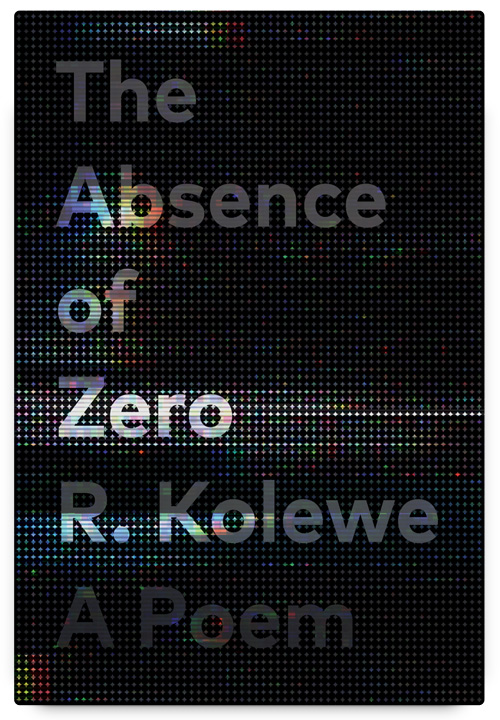R. Kolewe’s latest publication, The Absence of Zero, is a marathon long-poem that derives its form from the Riemann curvature tensor, a concept central to supporting the theory of general relativity. This formula determines the extent to which a space is curved or not. While visualizing an object or space can often tell a perceiver if a space is flat or curved, this formula is vital when one cannot fully visually apprehend the space they are trying to grasp. This idea of apprehension of the peripherally unseen underlies the entire collection, which is an extended meditation on interruptions, knowledge, and other “scraps of the 20th century” (“1.1.3.3”).

Yet, the precise curvature of the 20th century remains elusive; in “1.1.3.3,” Kolewe writes: “no prediction of spacetime, therefore no meaning for spacetime / if I rewrote from memory & forgetting.” The speaker is preoccupied with an ideal of revision, as though repetition will allow him to finally rest on a solid conclusion about the state of himself, or the state of his particular spatiotemporal moment.
Both memory and location, however, remain ambiguous, and the speaker finds himself returning to the same lines or phrases over and over again. Emerging from syntactic architectures of mathematically produced affect and the recurrent leitmotifs of light, time, and weather, the text is equally invested in the performance of revision. Lines will recur across pages, sometimes a stanza remains intact, like a vase excavated, but other times, it is broken apart.
There is no fixed message in the search for an understanding of time, space, or memory, and the epic remains under a “cloud of unknowing brief & always” (“2.1.3.0”). Stemming from Kolewe’s investment in uncovering the function and dissonances within memory, the poem’s speaker seems transfixed by the idea of exact depiction—yet seems to accommodate the possibility that accurate, objective representation cannot fully be rendered in language.
Kolewe’s investigation into the 20th century is fragmented, as it circles back to the same phrases and ideas. “Light shifts,” he writes, “Light slants, conciliate or another word / for what light could say” (“2.1.2.3”). This line seems to catch the ephemerality of the draft in motion—a reminder to the writer to find a more exact word, and a deliberate illumination of the editorialization of language through poetry.
The collection, composed of 256 sixteen-line quartets and 34 free-form interruptions, is both sprawling and corralled within a set range of sources. As the notes on the construction of the poem at the end of the book detail, the palimpsestic long-poem is comprised of extensive intertexts, including T. S. Eliot’s Four Quartets, Stephen Hawking and George Ellis’s The Large Scale Structure of Space-Time, and Kolewe’s own notes. Without this context, the repetitive nature of the text slowly dawns on the reader, as they become gradually immersed in a recursive, repetitive world:
“Perhaps forgetting is pure unknowing possible
to be precise. Outlines can be enough
curving / falling / recited / absence
pools of rain & mossy stones” (“3.3.3.3”)
Bios
Paisley Conrad
Paisley Conrad is poet, reviewer and MA candidate in English literature at Concordia University. She writes about literature and the climate crisis at The New Twenties and enjoys the weather. [updated April 2023]

